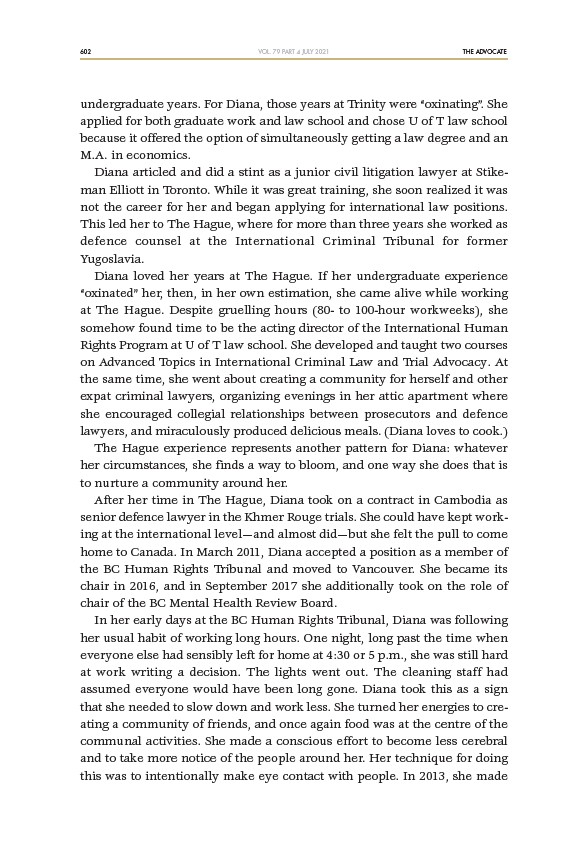
602 THE ADVOCATE
VOL. 79 PART 4 JULY 2021
undergraduate years. For Diana, those years at Trinity were “oxinating”. She
applied for both graduate work and law school and chose U of T law school
because it offered the option of simultaneously getting a law degree and an
M.A. in economics.
Diana articled and did a stint as a junior civil litigation lawyer at Stikeman
Elliott in Toronto. While it was great training, she soon realized it was
not the career for her and began applying for international law positions.
This led her to The Hague, where for more than three years she worked as
defence counsel at the International Criminal Tribunal for former
Yugoslavia.
Diana loved her years at The Hague. If her undergraduate experience
“oxinated” her, then, in her own estimation, she came alive while working
at The Hague. Despite gruelling hours (80- to 100-hour workweeks), she
somehow found time to be the acting director of the International Human
Rights Program at U of T law school. She developed and taught two courses
on Advanced Topics in International Criminal Law and Trial Advocacy. At
the same time, she went about creating a community for herself and other
expat criminal lawyers, organizing evenings in her attic apartment where
she encouraged collegial relationships between prosecutors and defence
lawyers, and miraculously produced delicious meals. (Diana loves to cook.)
The Hague experience represents another pattern for Diana: whatever
her circumstances, she finds a way to bloom, and one way she does that is
to nurture a community around her.
After her time in The Hague, Diana took on a contract in Cambodia as
senior defence lawyer in the Khmer Rouge trials. She could have kept working
at the international level—and almost did—but she felt the pull to come
home to Canada. In March 2011, Diana accepted a position as a member of
the BC Human Rights Tribunal and moved to Vancouver. She became its
chair in 2016, and in September 2017 she additionally took on the role of
chair of the BC Mental Health Review Board.
In her early days at the BC Human Rights Tribunal, Diana was following
her usual habit of working long hours. One night, long past the time when
everyone else had sensibly left for home at 4:30 or 5 p.m., she was still hard
at work writing a decision. The lights went out. The cleaning staff had
assumed everyone would have been long gone. Diana took this as a sign
that she needed to slow down and work less. She turned her energies to creating
a community of friends, and once again food was at the centre of the
communal activities. She made a conscious effort to become less cerebral
and to take more notice of the people around her. Her technique for doing
this was to intentionally make eye contact with people. In 2013, she made